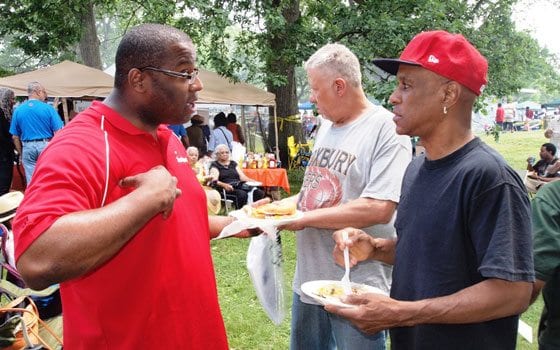

Author: Tony IrvingDistrict 7 City Councilor Tito Jackson shares a moment with Bobby Parks and George Jordan during the Roxbury Reunion Saturday at Franklin Park. Parks and Jordan were part of a cohort of friends who came of age in the late 1960s in Roxbury.
For many of them, it started at the Lewis School, the David A. Ellis or the Campbell. Friendships were formed that extended from elementary school, through middle and high school at Boston English High or Boston Tech.
Though their professional lives took divergent paths — the Vietnam War, the Black Panther Party’s Boston chapter, the Boston Police Department or the corporate world — the friends who grew up on Munroe Street, Walnut Avenue or Humboldt Avenue stayed in touch.
“We’ve always been together for years,” said Greg Jones, now retired from a career in the shipping business. “We’ve all known each other since the mid 1950s.”
They’ve seen Roxbury change from a neighborhood that was largely Jewish and black, to all black, and now to a mixture of blacks and Latinos with a smattering of whites. Through all the changes, they have maintained a bond forged when Roxbury residents looked out for each other.
“You hear this cliché, ‘it takes a village,’ ” said Val Boston, a business consultant. “That’s what we had. All the parents took care of us.”
For Boston and his friends, the Roxbury Reunion is the main event for catching up with old friends. Members of social clubs, street gangs and other neighborhood-based groups from the 1940s, 1950s and 1960s founded the event as a way of re-connecting with friends, many of whom visit from out-of-state.
This year, a crowd estimated at 5,000 turned out for the event in Franklin Park. Groups of friends and extended families staked out territory in the Playstead area of the park with chairs, tents and barbeque grills.
Boston and his friends wore blue shirts with “the bunch,” silk screened on the front signifying their affiliation as a group of friends who came of age in the late 1960s. Serving food under a tent was Doug Miranda, who headed the Boston chapter of the Black Panther Party.
“The Panthers started out with a free breakfast program for school children,” he said. “We established a free health care clinic and worked on human rights issues.”
Miranda, who went on to work in the human services field, says life in Roxbury in the 1950s and 1960s informed his career choices. He’s not the only one to make that observation.
“We all were in Boston at a time when we had to stick together as a people,” said Ernie Washington, who runs a building maintenance and cleaning business and mentors Boston youths who are seeking work.
“We survived an era in Boston that was very challenging,” Boston said. “But we had a foundation that allowed us not just to survive, but to thrive. There was a foundation that helped us develop into who we are.”
Greg Jones says he was inspired by pillars of the Roxbury community who came before him.
“I used to speak a lot to Mrs. Cass about the ideas she had for taking care of the basic needs of poor folks,” he said, referring to legendary Roxbury community activist Melnea Cass.
While some Roxbury residents from that era left the city, many have stayed in Roxbury and live on the same streets where they grew up. Sometimes they connect at parties where “oldies” music from the 1960s plays. Sometimes they meet at the Beantown Jazz Festival. But the connection is always there.
“When we come back together without having seen each other for five or six years, it doesn’t really matter,” Boston said. “The time we were apart is condensed.”







